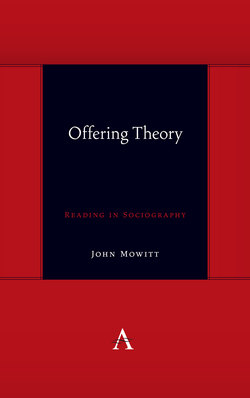Читать книгу Offering Theory - John Mowitt - Страница 7
ОглавлениеAware of the countless voices that have pricked my ears, my habit is to be long-winded in acknowledging them. However, “the world” (Brexit, Trump, Hong Kong, Brazil, Venezuela and now COVID-19) has taken my breath away. Not quite speechless, but almost. Thus, beyond Jeffrey Di Leo and Megan Greiving at Anthem, only the bare essentials.
The readings that comprise this text straddle two continents. In 2013 I ended my long affiliation with the University of Minnesota and the department I helped invent, Cultural Studies and Comparative Literature, to join the School of Fine Art, History of Art and Cultural Studies, at the University of Leeds. Colleagues and friends from both institutions deserve my gratitude whether welcomed or not.
At Minnesota I am thinking especially of Cesare Casarino, Vinay Gidwani, Qadri Ismail, Michal Kobialka, Richard Leppert, Tom Pepper, J. B. Shank, Ajay Skaria and Shaden Tageldin as well as Lisa Disch, Andreas Gaillus, Rembert Hüser, Premesh Lalu, Helena Pohlandt-McCormick, Verena Mund, Anaïs Nony, Simona Sawhney, Naomi Scheman and Adam Sitze who, like me, have since moved on.
At Leeds the list is short, but growing. I especially want to acknowledge the provocations of Jason Allen-Paissant, Barbara Engh, Gail Day, Sam Durrant, Eric Prenowitz as well as Adrian Rifkin, Marcel Swiboda (who, among other brilliant things, prepared the index) and Jane Taylor, all of whom have since left.
Since coming to Leeds my more irregular affiliations with the University of Western Cape and with the University of Fort Hare have deepened considerably. Many of the concepts invented in the chapters that follow developed out of these friendships and I want especially to acknowledge the voices of Maurits van Bever Donker, Heidi Grunebaum, Patricia Hayes, Gary Minkley, Ross Truscott and the unfathomably deep talent pool gathered around them.
In this spirit somewhat more formal thanks are owed to the various friends and colleagues who have invited me to address them, their colleagues and students on the matter of Theory: Karyn Ball at the University of Alberta, Jonathan Bordo and Andrew Wernick at Tent University, Paul Bouissac at the University of Toronto, Griselda Pollock at the University of Leeds, Tilottama Rajan at the University of Western Ontario, Lynn Turner at Goldsmiths, the organizers of “The Humanities Improvised” (notably Premesh Lalu and Jim Chandler) at the Consortium of Humanities Centers and Institutes, seminar leaders (especially Jeffrey Di Leo and Zahi Zalloua) at the American Comparative Literature Association and the organizers at the Cultural Studies Association (notably Patricia Clough and Randy Johnson). Enablers all.
As the bicontinental character of these pieces might suggest, some of them, in various iterations and guises, have appeared in print before. Formal acknowledgment of their sources appears as stipulated by the presses granting permission to recycle. I am professionally grateful to them all: Canadian Journal of Comparative Literature, Taylor and Francis and Symplokē. More directly though I want to acknowledge and thank Peggy Kamuf for helping me gain access to the Jacques Derrida papers held in Special Collections at the Langson Library at UC-Irvine and for permitting me to cite from the as-yet unpublished seminar, “Language and the Method of Discourse.”
But if “essentials” is the watchword of these remarks, two more personal acknowledgments are in order. First and foremost, I want to thank Jeanine, Rosalind and Rachel for their patience and generosity during the interminable gestation of these thoughts. Jeanine Ferguson in particular continues to humble me with her wisdom, her willingness to try out titles, turns of phrase, topics and remain, in spite of it all, in my company. With endless gratitude and affection.
Lastly, I want to thank “mi bibliotecario,” Jose Rodriguez Dod, a very early collaborator who, with his wife Eloisa, has routinely welcomed me into his home and its boundless shelves of all those texts you didn’t know you needed until you did. A near fatal illness almost broke off our friendship. I am thankful it did not.
